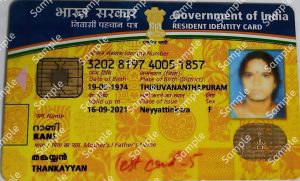Ministry of Home Affairs : National Population Register(NPR)/MultiPurpose National Identity Card(MNIC)
 The National Population Register(NPR) was a Register for the residents of India. It was prepared at the local (Village/sub-Town), sub-District, District, State, and National level under provisions of the Citizenship Act 1955 and the Citizenship (Registration of Citizens and Issue of National Identity Cards) Rules, 2003. It was mandatory for every resident of India to register in the NPR.
The National Population Register(NPR) was a Register for the residents of India. It was prepared at the local (Village/sub-Town), sub-District, District, State, and National level under provisions of the Citizenship Act 1955 and the Citizenship (Registration of Citizens and Issue of National Identity Cards) Rules, 2003. It was mandatory for every resident of India to register in the NPR.
The objective of the NPR was to create a comprehensive identity database of every resident in the country. Further, the Ministry of Home Affairs, Government of India decided to issue microprocessor-based national I-cards under NPR being created by the Census Office. As part of this project initiative, a pilot project was conducted to issue these cards to coastal villages and towns. The Resident Identity Card (RIC) was based on a 64 KB capacity smart card. The demographic and a few bio-metric attributes of the resident were embedded in the chip. The embedded data facilitated offline authentication of residents at remote locations where internet connectivity was not available. This helped in plugging leakages in the service delivery of other social inclusion projects managed by the GOI. The RIC card also carried the bearer’s AADHAAR number. More than 7 Lakh Cards have been issued under this project.
Guidelines for MNIC specific SCOSTA Certification
Microelectronics module Product Certification scheme is a third party Certification scheme promoted by NIC, Department of Information Technology, Government of India. This scheme is intended to provide by means of system assessment, testing and subsequent surveillance, an adequate level of confidence that the Microelectronics module product conforms to the specified requirements of appropriate standards.
Requirements for Microelectronics module on Smart Card product specifications for MNIC
- Microprocessor based IC module with contacts and with a minimum available on 16kbyte of E2 PROM
- Compliant to ISO/IEC 7816-1,2 &3
- Compliant to SCOSTA v1.2b dated March 15, 2002, including all addendums and errata including the latest of dated 1st July 2006
- Supply voltage 3V nominal
- T=0 or T=1 transport protocol
- Min 10 years data retention
- Min 300,000 E2PROM write cycles
- Operating ambient temperature range –25C to +55 Deg C
- Microelectronics modules must have data objects for card sequence no (Tag 5F34) and cards primary account no (Tag 5A) at the MF level as per ISO 7816-6. Once
programmed these data objects can not be changed. - The card must be Non-initialized SCOSTA card.
Product Certification: The Certification of compliance for the product will be issued only for the Microelectronics module but applicant will submit the Microelectronics modules embedded on the plastic card for testing purpose.
The Microelectronics Module will be tested in either in single phase (Only hard masked) or in two phases, i.e.
- Soft masked
- Hard Masked
No. of Microelectronics Module to be submitted
(The Microelectronics Module should be embedded in card for testing purpose)
- TSoft Mask Chip:T 10 numbers of Modules embedded in card to be submitted. After testing, the applicant shall take the corrective action and resubmit the 30 cards (hard mask) for testing. Charges for One cycle of regression testing are included in the initial testing Fee (as applicable in case of Smart Card testing).
- THard Mask Chip:T 30 numbers of Module embedded in card to be submitted. No provision for regression testing is made here. However after testing, the client may take the corrective action and resubmit fresh application for testing along with the 30 cards and test Fee (as applicable in case of Smart Card testing).
Testing: The Microelectronic module will be tested as per the following specifications:
- SCOSTA specification V1.2b : March 2002 including all addendums and errata including the latest of dated 1st July 2006
- MNIC Applications.
Documents Along with Application:
Following documents should be submitted along with application:
- Certificate/Declaration for ISO 9001:2000 Certification for manufacturing facility for manufacturing of Microelectronics Module.
- Certificate/Declaration for ISO 9001:2000 Certificate of the supplier/ client facility of Microelectronics Module.
- Certificate/ Declaration of conformity with ISO 7816. Part.-1,2,3
- Certificate/ Declaration of conformity with ISO 7816. Part.-4,8,9
- Certificate of Incorporation in India
- “Certificate of registration” for brand name of product
- Certificate/ Declaration for ITSEC3/EAL 4 and above or NIST Common criteria(ISO 15408) for conformity of chip security assurance.
- ATR Details with. Byte by byte description.
- Operating System Manual
- Chip Technical Manual
- The Microelectronic Modules submitted by the Applicants should have Applicant Name, its Brand name and the Chip Serial number duly printed on the card.

